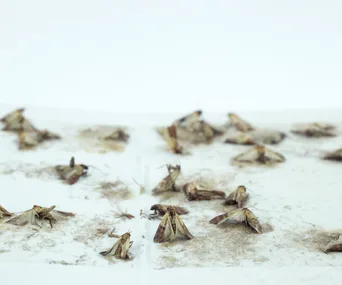You know the drill: you unpack your delicious fresh produce into the fruit bowl and it seems to be a call to action for all the fruit flies in the neighbourhood to swarm your kitchen. Or perhaps you pour a glass of wine at the end of a long day and two sips in you discover an interloping fruit fly wading about in your vino.
Sound familiar? Being invaded by them is like something out of scary movie. To add to the horror is knowing what to use to get rid of fruit flies fast.
The drosophilidae, commonly known as the fermentation or fruit fly, can lay up to 500 eggs in their eight to 14-day life cycle. They lay eggs in your over-ripe fruit, your dishcloth or in your drain and garbage bin which hatch in one day. Eradicating them once they’ve set up camp can be a nightmare.

What gets rid of fruit flies?
1. Your first step to a fruit-fly free zone is removing anything that draws their attention. Ripening, or overripe fruits, and vegetables like onions, potatoes and tomatoes are major culprits, as are recycling bins complete with small amounts of tasty bin juice.
“If there is no fermentation, there is no issue,” says Dean Hopping from Knockout Pest Control in Sydney.
“The flies lay in the fermentation, and tiny, little mini-maggots hatch. They feed immediately after hatching so by removing the fermentation you’re removing the source and breaking the cycle of reproduction.”
2. When buying fruit, ensure the skin is not broken or bruised, as this is especially interesting to fruit flies. The easiest course of action while trying to deal with them is to keep fruit and vegetables in the fridge, and dispose of organic compost and recycling immediately (this also hides evidence of wine bottles as an aside) until you fix the issue.
“Rotating fruit can also help. If the top of the fruit bowl looks nice and fresh but your potatoes and onions are at the bottom of the bowl and are starting to ferment, fruit flies will be laying in there and hovering all around,” says Hopping.
There are various ways to expel the dreaded fruit fly from your home once and for all, but they will need to be repeated seasonally or as required.
“Pest control can’t always find the source. We can smear a pheromone paste on the walls to attract the mature flies, but without finding the source you won’t stop juniors hatching,” tells Hopping.
There is no permanent solution except moving to South Australia where strict border control and quarantine has kept them (thus far) free from the pest.
5 chemical-free fruit fly traps that actually work
1. Detergent death-trap cocktail
Add 1 drop of detergent to a quarter of a glass of wine and leave overnight on the bench top next to your fruit bowl. They pop in for a tasty cocktail and die in the process.
2. Apple cider vinegar
Pour 1-2 tablespoons of apple cider vinegar in an open jar or small bowl and leave on the kitchen bench for a couple of days. Fruit flies are attracted to it and drown.
3. Sneaky fruit trap
Add a few pieces of ripe, skinless banana or overripe pear or stone-fruit to a small bowl. Add 2 tablespoons of balsamic vinegar and stir to combine. Cover the bowl tightly with plastic wrap and pierce a few holes in it with a fork. The flies will be attracted to the fruit, sneak in the holes and forever be stuck in the bowl.
4. Essential oil spray
Traditional insect spray may kill a few of these bad boys, but it’s toxic in your kitchen. Homemade essential oil spray won’t kill them, but they don’t like the way it smells and it will act as a deterrent.
For best effect, do one of the other treatments first to get rid of existing fruit-flies then spray this fresh-smelling concoction to prevent new ones from swinging by and moving in.
Make a solution with a few drops of tea-tree or eucalyptus oil in water and pop into a spray bottle to spray liberally around the affected areas.
5. Drain shower
Make a bucket of boiling water and detergent and pour it down your sink. This will kill any eggs living in your drain and give the adults a lovely bath all the way into the sewerage system.


